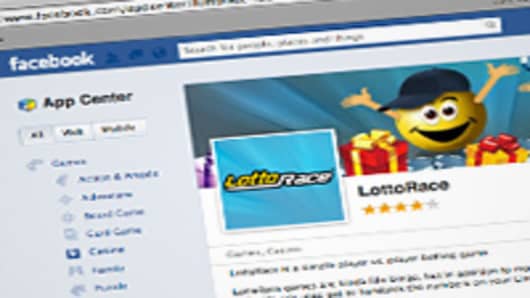More than half a billion dollars in profits moves through Oregon’s economy every year, supporting projects big and small. So when people participate, they at least feel they’re contributing to the well-being of the state in which they live their lives.
The business of supplementing state government income through lotteries has grown so large that there’s even a non-profit organization, The Multi-State Lottery Association, that administers the games submitted by each member state.
This is just a small part of the business of lottery games and electronic online gaming. There are billions of dollars to be made selling everything from lottery systems to online gaming to the casino gaming industry.
One of the publicly traded companies that is fully immersed as a global leader in providing customized, end-to-end gaming solutions to lottery and gaming organizations is Scientific Games.
Scientific’s integrated array of products and services are like a menu of almost everything that any lottery, online gaming business, and casino on the planet would need and want to buy.
This “menu” includes instant lottery games, lottery gaming systems, terminals and services, and Internet applications, as well as server-based interactive gaming machines and associated gaming control systems.
The gaming and casino industry has been soft in the U.S., but it’s booming in places like China (Macau) and many of the Asian nations that allow gambling.
Year-over-year revenue grew by 19 percent at Scientific Games last quarter. Yet the company has a large debt load and its profit margin slipped into the negative, although its operating margin (trailing 12 months) is a positive 12 percent. Evidently the situation at Scientific may soon be improving.
Even though the stock moved down precipitously from its $13.08 52-week high, it had a nice pop higher off its July 12 low of $7.98. On heavier-than-normal volume, it moved almost 5 percent higher on Wednesday, July 18, and it continues moving higher on Thursday, July 19.
The share price slump recently caught the eye of billionaire activist Ronald Perelman, who is listed as one of the 25 richest people in the U.S.
In early June 2012, Perelman purchased 805,000 shares of Scientific, most at about $8.13 a share. He now owns (both directly and indirectly) more than 32.5 million shares. As of Wednesday’s closing price of $8.79, that gives him almost $286 million worth of “skin” in this game.
Lorne Weil, the company’s chairman and CEO, is also a heavy investor. As of March 22, 2012, he owned more than 1.8 million shares. That’s the kind of insider commitment an investor likes to see.
The next date for announcing its earnings is Aug. 8. Scientific is expected to earn close to 50 cents a share in 2012 and nearly 75 cents in 2013. Analysts, on average, have been calling for a 12-month price target of around $13.50, but with financial powerhouses like Perelman invested heavily in Scientific, somewhere between $15 and $20 might be realistic.
The large-cap dark horse in the race to capture lottery and gaming business happens to be none other than Facebook. More and more advertising revenue is being generated on the giant social networking site from the explosive growth of the gaming industry.
Facebook users by the hundreds of millions wonder how Facebook makes money. The answer is mainly through numerous forms of advertising. Facebook advertisements give advertisers a way to target people in specific niches that are interested in what they have to offer.
The advertisements that are placed on a Facebook page are based off of the interests that subscribers list in their profiles. For example, if you list playing the lottery or online gaming as one of your activities, you may see an advertisement on your Facebook pages to purchase lottery tickets or special offers to vacation at casinos in your area.
CEO Mark Zuckerberg wrote in his founder’s letter that accompanied Facebook’s S-1 filing that he knows the importance of giving both subscribers and advertisers what they want. In his letter, he said, “We don’t build services to make money; we make money to build better services.”
Facebook hopes to make earnings progress through the growth of self-service ads. Self-service ads, which appear on the right side of the screen on Facebook, accounted for about $600 million to approximately $300 million. This is another way the lottery business and other legal forms of gaming can promote themselves and solicit more participation. For Facebook, it’s all about bringing what people want directly to them.
Another form of advertising revenue involves engagement ads, which seek user-interaction (and sometimes feature user-endorsements). These ads bring in hundreds of millions of dollars each year.
Trading at 73 times current earnings and a staggering 45 times forward earnings makes it hard to recommend Facebook at current prices. Its trailing 12-month revenue of $4.04 billion is bound to grow, as last quarter’s year-over-year revenue growth reached 45 percent.
The lowest trading price we’ve seen since the May 18initial public offering occurred was on June 6, when it traded for as low as $25.52 intraday. That may create a technical support level.
Let’s wait until the July 26, second-quarter 2012 earnings call, the first one since going public, and see how the stock price reacts in the current economic environment of high-anxiety and much uncertainty.
There are billions of dollars to be captured in the world of lottery gaming and all other forms of legalized gambling. Scientific and Facebook are well positioned as both participants and beneficiaries.
—By TheStreet.com Contributor Marc Courtenay
Additional News: Arkansas Lottery Sales Up for Year; $474M Gross Sales
Additional Views: Groups Question Lottery Profits, Ohio School Funding
___________________________
CNBC Data Pages:
____________________________
Disclosures:
TheStreet's editorial policy prohibits staff editors, reporters and analysts from holding positions in any individual stocks. At the time of publication, Marc Courtenay had no positions in stocks mentioned.
Disclaimer


